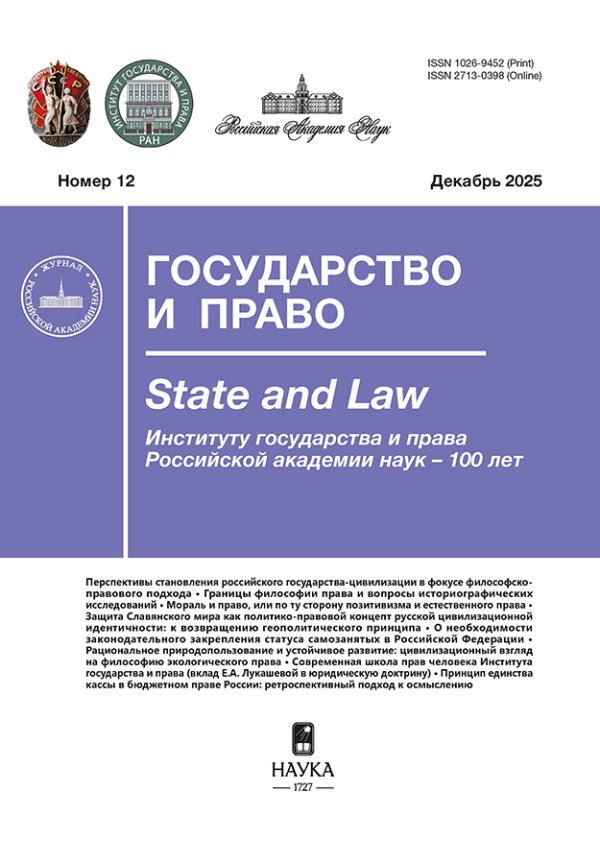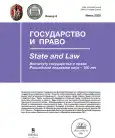ВЛИЯНИЕ ТЕХНОЛОГИЧЕСКОГО ФАКТОРА НА ТРАНСФОРМАЦИЮ ПРАВА ИНТЕЛЛЕКТУАЛЬНОЙ СОБСТВЕННОСТИ
- Авторы: Гурко А.В.1
-
Учреждения:
- РЭУ им. Г. В. Плеханова
- Выпуск: № 6 (2025)
- Страницы: 91-99
- Раздел: Гражданское и предпринимательское право
- URL: https://bakhtiniada.ru/1026-9452/article/view/305455
- DOI: https://doi.org/10.31857/S1026945225060083
- ID: 305455
Цитировать
Аннотация
В статье исследуются различного рода технологические факторы, оказывающие влияние на развитие права интеллектуальной собственности, а также механизм их воздействия на развитие правового регулирования в рассматриваемой сфере. На основании анализа норм права интеллектуальной собственности сделан вывод о том, что ключевым фактором развития права интеллектуальной собственности является цифровизация. Изменения, связанные с цифровизацией в сфере промышленной собственности, касаются административных процедур, но не других элементов правоотношений, поскольку правовая охрана промышленной собственности в принципе изначально ориентирована на максимальный учет любых потенциальных технологических изменений. Основные изменения произошли в сфере авторского права и смежных прав: появление новых субъектов права; создание новых объектов; закрепление за авторами и иными правообладателями новых прав и правомочий; введение новых ограничений и исключений; формирование новых договорных конструкций; появление новых форм и видов ответственности за нарушение авторских и смежных прав. Для решения проблемы выплаты вознаграждения правообладателям, за использование их произведений системами искусственного интеллекта предлагается создание Национального банка данных для развития систем искусственного интеллекта, который наполнялся бы произведениями по желанию авторов и правообладателей и материалы из которого могли бы за вознаграждение использовать разработчики генеративных нейросетей и иных систем искусственного интеллекта.
Об авторах
А. В. Гурко
РЭУ им. Г. В. Плеханова
Автор, ответственный за переписку.
Email: gurko.av@rea.ru
г. Москва, Стремянный пер., д. 36
Список литературы
- Витко В. С. Анализ научных представлений об авторе и правах на результаты деятельности искусственного интеллекта // ИС. Авторское право и смежные права. 2019. № 2. С. 5–20.
- Гаврилов Э. П. Авторское право и «диссертационное право» // Патенты и лицензии. Интеллектуальные права. 2018. № 12. С. 9–15.
- Гурко А. Искусственный интеллекта и авторское право: взгляд в будущее // Интеллектуальная собственность. Авторское право и смежные права. 2017. № 12. С. 7–18.
- Дремлюга Р. И., Дремлюга О. А. Искусственный интеллект – субъект права: аргументы за и против // Правовая политика и правовая жизнь. 2019. № 2. С. 120–125.
- Ивлиев Г. П., Егорова М. А. Юридическая проблематика правового статуса искусственного интеллекта и продуктов, созданных системами искусственного интеллекта // Журнал росс. права. 2022. № 6. С. 32–46.
- Калятин В. О. Определение субъекта прав на результаты интеллектуальной деятельности, созданные с использованием искусственного интеллекта // Право. Журнал ВШЭ. 2022. Т. 15. № 4. С. 24–50.
- Лессиг Л. Свободная культура / пер с англ. М., 2007.
- Маряскина Е. А., Некрасова И. В. Вторичные тексты как вариант «перекодировки» классики // Известия Самарского научного центра РАН. Социальные, гуманитарные, медико-биологические науки. 2021. № 80.
- Морхат П. М. Правосубъектность юнитов искусственного интеллекта. Гражданско-правовое исследование. М., 2018.
- Назаров Н. Признание авторства на результаты интеллектуальной деятельности, созданные искусственным интеллектом // Интеллектуальная собственность. Авторское право и смежные права. 2020. № 3. С. 53–62.
- Остроумов Н. В. Искусственный интеллект в праве: обзор существующих концепций правового регулирования отношений с участием носителей искусственного интеллекта // Законность и правопорядок. 2021. № 3 (31). С. 63.
- Рожкова М. А. Станет ли искусственный интеллект самостоятельным субъектом права? // Хозяйство и право. 2021. № 6 (533). С. 14–22.
- Савина В. С. Перспективы развития системы управления исключительными правами в условиях цифровизации // Интеллектуальная собственность. Промышленная собственность. 2024. № 3. С. 63–66.
- Синельникова В. Н., Ревинский О. В. Права на результаты искусственного интеллекта // Копирайт. 2017. № 4. С. 17–27.
- Харитонова Ю. С., Савина В. С. Технология искусственного интеллекта и право: вызовы современности // Вестник Пермского ун-та. Юридические науки. 2020. № 3. С. 524–549.
- Щитова А. А. Правовое регулирование информационных отношений по использованию систем искусственного интеллекта: дис. … канд. юрид. наук: 12.00.13. М., 2021.
- Ястребов О. А. Правосубъектность электронного лица: теоретико-методологические подходы // Труды ИГП РАН. 2018. Т. 13. № 2. С. 36–55.
- Bayamlioglu E. Intelligent Agents and Their Legal Status: an Essay on Artificial Intelligence and Personality // Ankara Bar Review. 2008. No. 1. Pp. 46–54.
- Krausova A. Intersections between Law and Artificial Intelligence // International Journal of Computer. Vol. 27. No. 1. Pp. 55–68.
- Solaiman S. M. Legal Personality of Robots, Corporations, Idols and Chimpanzees: a Quest for Legitimacy // Artificial Intelligence and Law. 2017. Vol. 25. No. 2. Pp. 155–179.
- Weitzenboeck E. M. Electronic Agents and the Formation of Contracts // International Journal of Law and Information Technology. 2001. Vol. 9. No. 3. Pp. 204–234.
Дополнительные файлы










